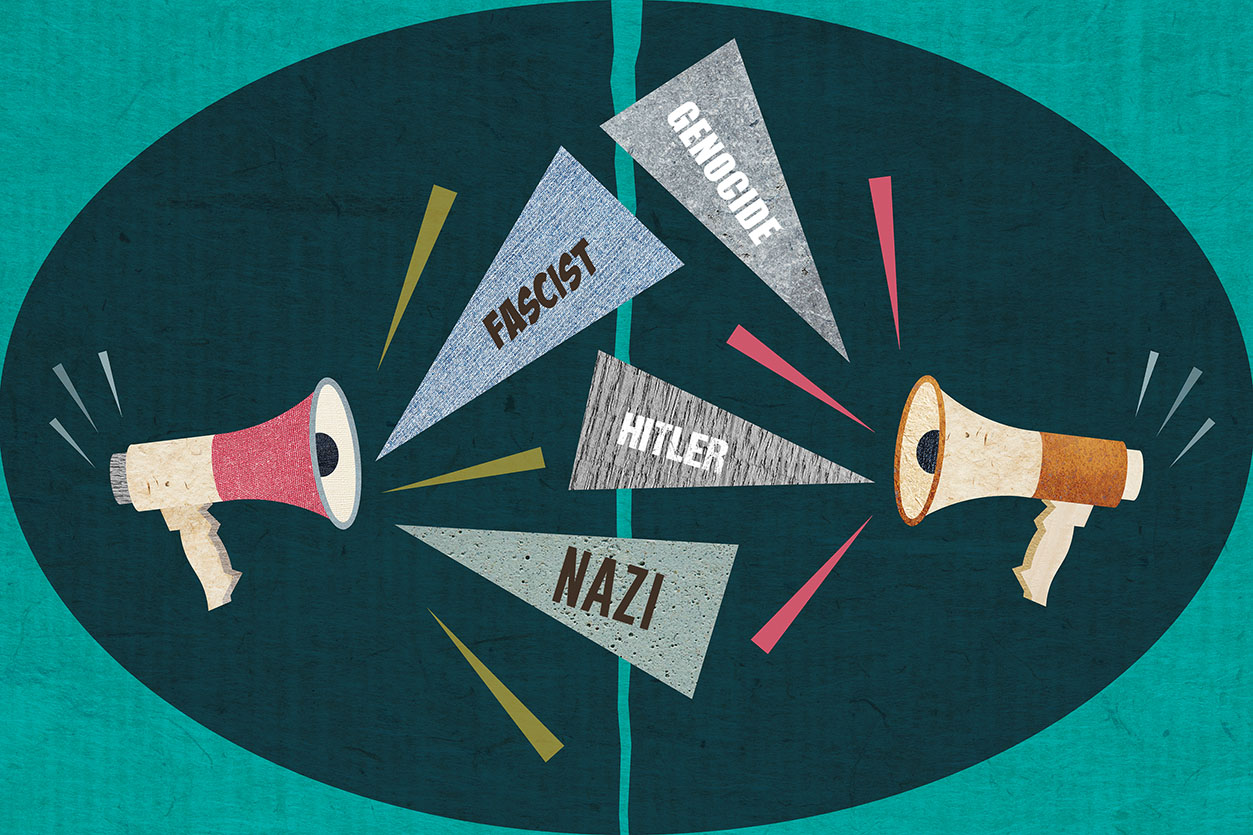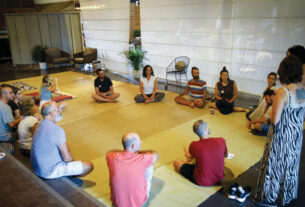Over the past few weeks I’ve witnessed a fascinating phenomenon: The closer we get to Election Day, the more those on the fringe deploy the word “Nazis” to serve their own agenda. Nazis, fascism, Hitler, genocide—all words hijacked and robbed of their meaning, all disconnected from their reality, un-fashioned and re-fashioned to serve a political goal.
War is now genocide, everyone on the other side is a fascist or a Nazi, and leaders we want to take down are Hitler. In the next 24 hours and especially after the election, be prepared to be inundated with these terms.
It’s nothing new. In fact it’s been happening for decades as people constantly move the goal posts of meaning for words that have power in American discourse. Who can forget the Republican obsession—and it wasn’t just the far right—with comparing Barack Obama to Hitler? It’s the knee-jerk response to anything that makes us uncomfortable, anything we don’t like, anything we disagree with—and everyone is doing it.
If you don’t like Israel or the war in Gaza, it’s genocide. You hate Donald Trump? Well it must be because he’s Hitler, “literally Hitler” as some people put it. It’s a linguistic free for all. If you can’t make your case thoughtfully and intelligently, just grab a word that will feel like you’ve dropped a bomb when it comes out of your mouth and apply it to whatever or whoever you don’t like. This is how we destroy people. Words connected to the Holocaust are now completely untethered from their historical contexts and have broadened so far that they are rendered meaningless, but we still use them as if they are nuclear bombs, reserved only for the worst of the worst.
I get why people do it. Nazis have been established as the ultimate bad guys, the dark heart of the evilest of evil. It’s a convenient categorization because once you call someone a Nazi, the assumption is that everyone will agree with you because everyone knows Nazis are bad. One obvious problem with this is that it’s not hard to get otherwise reasonable people to agree that “punching a Nazi” (cue the clip of Harrison Ford as Indiana Jones punching a Nazi) is a good thing, so call someone (or half the country) a Nazi and the implication is that any violence done toward such people is not only justified but also morally required. We have to take down the Nazis, right? We can’t allow fascism (which is always the other side) to reign in America, right? It’s the same thinking that has paved the way for open discrimination, bigotry, and violence against American Jews since Oct. 7. Accuse Israel of genocide and suddenly all Jews are Nazis deserving of violence. How convenient.
In many cases it’s coming from highly educated people—academic elites who presumably believe that their education has given them license to abuse terms in whatever way they like. It’s the ultimate entitlement: I get to decide what words mean and you have to accept it. I have the luxury of changing the meaning as I see fit because I am morally superior.
It’s the ultimate entitlement: I get to decide what words mean and you have to accept it.
I’ll state the obvious: Most of the people using this language are coming from the fringe left, though it’s certainly creeped into the social media posts of some on the liberal left. But I see it on the right, too. “Leftism is literally Hitler,” wrote one very educated woman on her social media page.
But right now, a good segment of the political left is convinced that Trump is the next Hitler who has vowed to usher in a new Third Reich. For example, one friend is tired of the “Don’t let politics ruin your friendships” posts, and suggests that half the country is cheering on Nazi ideology. “It’s time to ruin some f—king relationships over this s—t.” Another wonders how he can go about his usual business when “actual Nazis are prowling the streets.” If you’re voting for Trump you’re “standing with the Nazis” or just “Nazi scum,” writes another. Few people on the left will actually engage with his policies on immigration, the economy, and workers’ rights—the things that actually matter most to most Americans—because it’s easier to just call Trump a Nazi and write him off. And doing this reveals something deeply troubling: the extent to which so many people on the left are completely disconnected from what many average Americans are experiencing.
I reflect on my many years of Holocaust research, teaching, and publications and I think to myself: You have no idea what Nazism is.
But never mind those inconvenient details. After all, the Trump rally in Madison Square Garden was not a rally in which jokes some people find offensive were said. Instead, it was a Nazi rally, and people posted about how they were chilled to the bone thinking of the other Nazi rally that was held there in 1939. But as one rando on Twitter put it, Billy Joel also performed at this venue. Trump is no more Hitler than he is Billy Joel no matter how much we want it to be so.
Using the language of the Holocaust is a way to shut down dialogue, to make sure that people are afraid, to push them down under the surface of mainstream public discourse. But when people are silenced and pushed into corners and below surfaces, they don’t go away; they get angry, and rightfully so.
Using the language of the Holocaust is a way to shut down dialogue, to make sure that people are afraid, to push them down under the surface of mainstream public discourse.
There is nowhere this is more pronounced than on university campuses and academic circles. Recently, Newsweek op-ed editor Batya Ungar-Sargon posted a video that she calls a love letter to her community on the eve of the election. In the video, she explains why she is voting for Trump and why he is the candidate that most represents Jewish values. It’s a compelling video that breaks down many of the lies that are repeated constantly about Trump, and I passed it along to some liberal academic friends who I knew would not stop talking to me for having the audacity to entertain such a thing without banishing it to the dustbin of history. I shared it because it was smart and interesting and compelling—and because I still care about dialogue. I have friends who are voting for Harris. I have friends who are voting for Trump. All of them are good people who have good reasons for their decisions. I have also seen compelling cases made for Harris being the candidate that most represents Jewish values. We can entertain both of these possibilities.
But sharing Ungar-Sargon’s video started another kind of conversation—about the impossibility of having this kind of dialogue in academia. “When you live in the academic universe,” said one friend and colleague, “it’s impossible to discuss nuance.” If nothing else, the pervasiveness of the hijacked language of the Holocaust in academic circles and the fear that academics not voting for Harris have when it comes to voicing their dissent have revealed that there is a sickness on many of our campuses.
I remember earlier this year when I learned that the line attributed to Trump about there being “fine people on both sides” in the wake of Charlottesville was something taken completely out of context. I felt betrayed by the media and by journalists I had trusted once I listened to the entire clip and discovered that it had been edited in such a way as to paint Trump as the Nazi of our time. I remember sending the link to the complete video to friends who didn’t want to listen to it because they were so committed to their belief that he is a Nazi. “People are not willing to think it through,” says my colleague, not even in academia. Even when presented with evidence contrary to their beliefs, people will still insist on their original thought.
“People are not willing to think it through,” says my colleague, not even in academia.
Ungar-Sargon’s video felt important to me, even alongside competing claims for Harris as the appropriate Jewish choice, because it suggests that the nature of Jewish values is such that one could say either candidate represents them. (Let’s not forget the constantly competing perspectives of Hillel and Shammai.) The most important take away from the video, for me, is not necessarily that one should vote for Trump, but rather that it’s not inherently transgressive to vote for him. It’s not anti-Jewish. But as one academic friend who is voting for Trump told me, “If Trump wins I still have to act either sad and anxious or indifferent.” Why? Because in academia, admitting you voted for Trump is suicide because you will have become, yourself, a Nazi in the eyes of many of your colleagues.
People are afraid, and using these words can make us feel more powerful, as if we are naming the thing that needs to be destroyed, which is half the battle.
There’s a desperation in the hurling of these linguistic missives, and I understand why people feel desperate. For many, issues that they care about like abortion and other women’s rights, are seemingly on the line. People are afraid, and using these words can make us feel more powerful, as if we are naming the thing that needs to be destroyed, which is half the battle. But when we do it we are playing with fire, and slowly but surely we are ushering in the exact kind of violence that we thought we were fighting.
Monica Osborne is a former professor of literature, critical theory, and Jewish studies. She is Editor at Large at The Jewish Journal and is author of “The Midrashic Impulse.” X @DrMonicaOsborne




